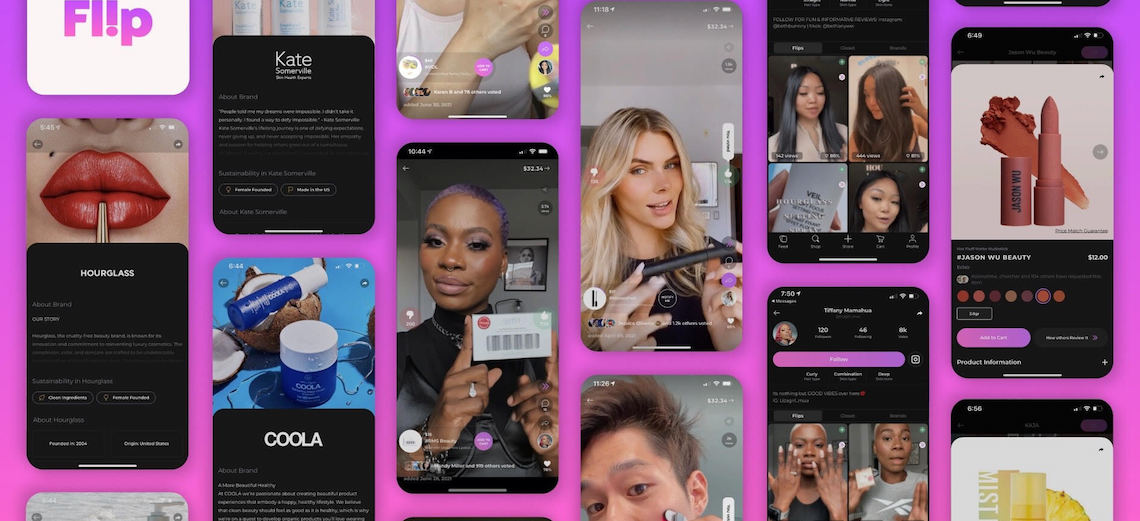While TikTok has been adding e-commerce functionality to its platform, beauty shopping startup Flip has gone all-in on bringing buying to the short video experience.
Launched in 2019, U.S.-based Flip announced $28 million in Series A funding on August 30 as it attracts a growing number of beauty brands selling through its short videos. The app is similar to TikTok, but every video is focused on beauty and has a built-in shopping link for a featured product. It currently sells over 200 brands, including Fekkai, Kaja, Hourglass Cosmetics, RMS Beauty, Joanna Vargas, Dr. Jart+, Zitsticka, Coola, Lord Jones, Happy Dance and Jason Wu Beauty. On average, the platform is adding about 20 brands a week and hopes to have 500 by the end of October.
“The most-watched type of content on almost every social platform, other than people dancing, is about beauty and skin care,” said Noor Agha, founder and CEO of Flip.
Unlike TikTok’s nascent e-commerce offering, which has brands handling their own fulfillment, Flip functions as an e-tailer. The platform offers one-click checkout for multiple brands, storing items in its two warehouses and shipping them in its own branded packaging. It currently offers one-day delivery in some locations, which it plans to expand across the U.S. with the opening of an additional four warehouses in the next nine months. It is currently purchasing products at wholesale prices from brands, but plans to eventually expand to an Amazon-style marketplace model.
The funding round will be invested in scaling the platform’s expansion of brands offered and recruiting more creators. It was led by Streamlined Ventures with participation from Mubadala Capital Ventures and BDMI, as well as individual investors including Ruby Lu, an early investor in China-based TikTok competitor Kuaishou.
Influencers with followings on other platforms have been posting Flip videos, and their Flip profile pages link out to Instagram and TikTok accounts. Jackie Flores, a beauty TikToker with 26,000 followers (@lajackieflores), has promoted on her Flip account brands including Dominque Cosmetics and I’m Meme. Meanwhile, makeup artist Sasha Karagianis (@sasha_sasha_mua on Instagram, with 37,000 followers) has promoted Jouer and Hourglass on Flip.
The platform currently has over 1 million downloads and has shipped over 30,000 orders so far, according to Agha. Its user acquisition strategy includes marketing to these influencers across other platforms, as well as offering them monetary incentives to get friends to sign up. It is planning on its “grand launch” with a more concerted marketing push in September.
Ad position: web_incontent_pos1
Another unique feature to attract users is Flip’s ability to monetize content for anyone on the platform, no matter how low their follower count.
“Our shoppers are our sellers,” said Agha. When users buy items on Flip, they can automatically go on the platform to review them in a short video. “You can monetize your content instantly. You don’t need a brand to make a deal with you,” he said.
According to Agha, the platform is aiming to uphold the feeling of authenticity and honesty that TikTok is known for in its beauty content.
“My vision and dream is to build the first honest commerce platform, where as a user — when you’re looking at the video, and someone’s saying, ‘This is good,’ or ‘This is bad’ — you genuinely believe it,” said Agha. He added that “Gen Z is by nature much more authentic. They’re much less prone to falling for fake, polished content. They really want the reality of things.”
“We chose to partner with Flip due to its highly engaged shoppers as well as the authenticity of the content,” said Crystal Wood, chief commercial officer of Fekkai, which joined Flip in August 2021. She added that the platform provides “access to highly engaged beauty junkies.”
Ad position: web_incontent_pos2
As the short video format has swept the social media landscape through platforms like TikTok and Instagram’s Reels, it is expected to play a growing role in social commerce. Prior to TikTok’s development of shopping capabilities, Instagram made its Reels feature shoppable.
“Gone are the days where people would read text-heavy descriptors,” said Wood. “Consumers want to see [products] in action. Compelling videos can also transcend language barriers.”
The platform plans to keep the app exclusive to beauty, for now, and will expand to other categories “down the line,” said Agha.
While platforms’ development of social shopping has taken off in the U.S. during the pandemic, Agha believes that this was a trend already in motion. “I actually don’t think it’s related to the pandemic in any way or form,” he said.
“In 10 years, this will become the most normal thing,” he said of the app’s shopping format. “In the way that it used to be very weird to shop online, people will shop through video; people will shop through their social network.”




